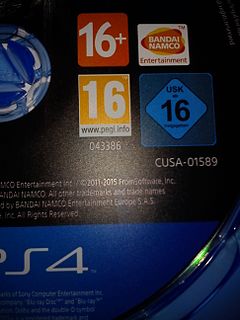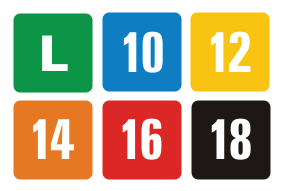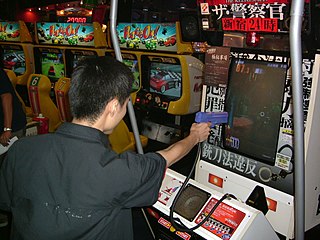 W
WA video game content rating system is a system used for the classification of video games into suitability related groups. Most of these systems are associated with and/or sponsored by a government, and are sometimes part of the local motion picture rating system. The utility of such ratings has been called into question by studies that publish findings such as 90% of teenagers claim that their parents "never" check the ratings before allowing them to rent or buy video games, and as such, calls have been made to "fix" the existing rating systems. Video game content rating systems can be used as the basis for laws that cover the sales of video games to minors, such as in Australia. Rating checking and approval is part of the game localization when they are being prepared for their distribution in other countries or locales. These rating systems have also been used to voluntarily restrict sales of certain video games by stores, such as the German retailer Galeria Kaufhof's removal of all video games rated 18+ by the USK following the Winnenden school shooting.
 W
WThe following is a list of video games that have been given the "Adults Only" (AO) rating by the Entertainment Software Rating Board (ESRB), a United States-based organization which rates the content of video games to determine its appropriateness for specific age groups. Although it is not legally binding under U.S. law, the ESRB rating system is a de facto standard which is self-enforced by the U.S. video game and retail industries. In some Canadian provinces, ESRB ratings are enforceable by law by local film classification boards.
 W
WThe Australian Classification Board is an Australian Government statutory body responsible for the classification and censorship of films, video games and publications for exhibition, sale or hire in Australia. The ACB was established in 1970 and was once part of the Office of Film and Literature Classification (OFLC), which was dissolved in 2006. The Department of Communications and the Arts now provides administrative support to the ACB and decisions made by the ACB may be reviewed by the Australian Classification Review Board. The ACB now operates under the Commonwealth Classification Act 1995.
 W
WThe British Board of Film Classification is a non-governmental organisation founded by the film industry in 1912 and responsible for the national classification and censorship of films exhibited at cinemas and video works released on physical media within the United Kingdom. It has a statutory requirement to classify all video works released on VHS, DVD, Blu-ray, and, to a lesser extent, some video games under the Video Recordings Act 1984. The BBFC was also the designated regulator for the UK age-verification scheme which was abandoned before being implemented.
 W
WThe Chilean video game content rating system, is a set of decrees that regulate the video game rating for video games sold in Chile since 2018. Chile and Brazil are the only countries in South America to officially adopt a video game content rating system other than the ESRB.
 W
WThe advisory rating is a content rating system for the classification of movies, games and television programs in Brazil. The ClassInd rating system is controlled by the Advisory Rating Coordination of the Department of Justice Politics. It is established on the National Secretariat of Justice of the Ministry of Justice.
 W
WThe Computer Entertainment Rating Organization (CERO) is a Japanese entertainment rating organization based in Tokyo that rates video game content in console games with levels of ratings that informs the customer(s) of the nature of the product and what age group it is suitable for. It was established in June 2002 as a branch of Computer Entertainment Supplier's Association, and became an officially recognized nonprofit organization in December 2003.
 W
WThe Entertainment Software Rating Association (ESRA) is a self-regulatory organization that assigns age and content ratings in Iran. The system was established in 2007 by the Iran National Foundation of Computer Games and has the status of a research project.
 W
WThe Entertainment Software Rating Board (ESRB) is an American self-regulatory organization that assigns age and content ratings to consumer video games. The ESRB was established in 1994 by the Entertainment Software Association, in response to criticism of controversial video games with excessively violent or sexual content, particularly after the 1993 congressional hearings following the releases of Mortal Kombat and Night Trap for home consoles and Doom for home computers. The industry, pressured with potential government oversight of video game ratings from these hearings, established both the IDSA and the ESRB within it to create a voluntary ratings system based on the Motion Picture Association of America film rating system with additional considerations for video game interactivity.
 W
WThe Film and Publication Board, or FPB, is a content-classification and regulation authority in South Africa, operating under the Minister of Communications. The FPB was established in 1996 under the Films and Publications Act, ostensibly to tackle issues of child pornography and child abuse, as well as to provide ratings to publicly consumed media such as movies, music and television programs. Under these directives, its mandate can be considered one of state censorship.
 W
WThe Finnish Board of Film Classification was an official institution of the Finnish Ministry of Education. From 1946 until the end of year 2011, the VET/SFB was responsible for inspecting and rating the content of movies and video games. In the beginning of 2012, the VET/SFB was dissolved and its functions were transferred to the Finnish Centre for Media Education and Audiovisual Media, likewise operating under the Ministry of Education.
 W
WThe International Age Rating Coalition (IARC) is an initiative aimed at streamlining acquisition of content ratings for video games, from authorities of different countries. Introduced in 2013, the IARC system simplifies the process of obtaining ratings by developers, through the use of questionnaires, which assess the content of the product. This new process reduces the costs of video game developers as they seek to obtain ratings for their products that are distributed digitally online.
 W
WThe National Media Council (NMC) is a federal institution of the United Arab Emirates (UAE) that was established by virtue of Federal Law No. 1 of 2006. It promotes and supports all media-related initiatives and activities in the UAE and abroad. Goals set for the council are “Providing an integrated regulatory environment conductive to the development of the media sector in the UAE, highlighting the UAE accomplishments in media both nationally and internationally and ensuring that all administration services are delivered with high quality, efficiency and transparency”
 W
WPan European Game Information (PEGI) is a European video game content rating system established to help European consumers make informed decisions when buying video games or apps through the use of age recommendations and content descriptors. It was developed by the Interactive Software Federation of Europe (ISFE) and came into use in April 2003; it replaced many national age rating systems with a single European system. The PEGI system is now used in 39 countries and is based on a code of conduct, a set of rules to which every publisher using the PEGI system is contractually committed. PEGI self-regulation is composed by five age categories and eight content descriptors that advise the suitability of a game for a certain age range based on the game's content. The age rating is not intended to indicate the difficulty of the game or the skill required to play it.
 W
WAn arcade game or coin-op game is a coin-operated entertainment machine typically installed in public businesses such as restaurants, bars and amusement arcades. Most arcade games are video games, pinball machines, electro-mechanical games, redemption games or merchandisers.